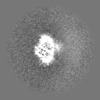[English] 日本語
 Yorodumi
Yorodumi- EMDB-10632: Structure of glutamate transporter homologue GltTk in the presenc... -
+ Open data
Open data
- Basic information
Basic information
| Entry | Database: EMDB / ID: EMD-10632 | |||||||||
|---|---|---|---|---|---|---|---|---|---|---|
| Title | Structure of glutamate transporter homologue GltTk in the presence of TBOA inhibitor | |||||||||
 Map data Map data | ||||||||||
 Sample Sample |
| |||||||||
 Keywords Keywords | AMINO ACID TRANSPORTER / ASPARTATE TRANSPORT / GLUTAMATE TRANSPORTER HOMOLOGUE / TRANSPORT PROTEIN / MEMBRANE PROTEIN | |||||||||
| Function / homology | carboxylic acid transport / Sodium:dicarboxylate symporter / Sodium:dicarboxylate symporter, conserved site / Sodium:dicarboxylate symporter superfamily / Sodium:dicarboxylate symporter family / Sodium:dicarboxylate symporter family signature 1. / symporter activity / membrane / Proton/glutamate symporter, SDF family Function and homology information Function and homology information | |||||||||
| Biological species |   Thermococcus kodakarensis KOD1 (archaea) / Thermococcus kodakarensis KOD1 (archaea) /   Thermococcus kodakarensis (strain ATCC BAA-918 / JCM 12380 / KOD1) (archaea) Thermococcus kodakarensis (strain ATCC BAA-918 / JCM 12380 / KOD1) (archaea) | |||||||||
| Method | single particle reconstruction / cryo EM / Resolution: 3.47 Å | |||||||||
 Authors Authors | Arkhipova V / Slotboom DJ | |||||||||
 Citation Citation |  Journal: Nat Commun / Year: 2020 Journal: Nat Commun / Year: 2020Title: Structural ensemble of a glutamate transporter homologue in lipid nanodisc environment. Authors: Valentina Arkhipova / Albert Guskov / Dirk J Slotboom /   Abstract: Glutamate transporters are cation-coupled secondary active membrane transporters that clear the neurotransmitter L-glutamate from the synaptic cleft. These transporters are homotrimers, with each ...Glutamate transporters are cation-coupled secondary active membrane transporters that clear the neurotransmitter L-glutamate from the synaptic cleft. These transporters are homotrimers, with each protomer functioning independently by an elevator-type mechanism, in which a mobile transport domain alternates between inward- and outward-oriented states. Using single-particle cryo-EM we have determined five structures of the glutamate transporter homologue Glt, a Na- L-aspartate symporter, embedded in lipid nanodiscs. Dependent on the substrate concentrations used, the protomers of the trimer adopt a variety of asymmetrical conformations, consistent with the independent movement. Six of the 15 resolved protomers are in a hitherto elusive state of the transport cycle in which the inward-facing transporters are loaded with Na ions. These structures explain how substrate-leakage is prevented - a strict requirement for coupled transport. The belt protein of the lipid nanodiscs bends around the inward oriented protomers, suggesting that membrane deformations occur during transport. | |||||||||
| History |
|
- Structure visualization
Structure visualization
| Movie |
 Movie viewer Movie viewer |
|---|---|
| Structure viewer | EM map:  SurfView SurfView Molmil Molmil Jmol/JSmol Jmol/JSmol |
| Supplemental images |
- Downloads & links
Downloads & links
-EMDB archive
| Map data |  emd_10632.map.gz emd_10632.map.gz | 32.2 MB |  EMDB map data format EMDB map data format | |
|---|---|---|---|---|
| Header (meta data) |  emd-10632-v30.xml emd-10632-v30.xml emd-10632.xml emd-10632.xml | 11.5 KB 11.5 KB | Display Display |  EMDB header EMDB header |
| Images |  emd_10632.png emd_10632.png | 103.7 KB | ||
| Filedesc metadata |  emd-10632.cif.gz emd-10632.cif.gz | 5.3 KB | ||
| Others |  emd_10632_additional.map.gz emd_10632_additional.map.gz | 57 MB | ||
| Archive directory |  http://ftp.pdbj.org/pub/emdb/structures/EMD-10632 http://ftp.pdbj.org/pub/emdb/structures/EMD-10632 ftp://ftp.pdbj.org/pub/emdb/structures/EMD-10632 ftp://ftp.pdbj.org/pub/emdb/structures/EMD-10632 | HTTPS FTP |
-Validation report
| Summary document |  emd_10632_validation.pdf.gz emd_10632_validation.pdf.gz | 477.5 KB | Display |  EMDB validaton report EMDB validaton report |
|---|---|---|---|---|
| Full document |  emd_10632_full_validation.pdf.gz emd_10632_full_validation.pdf.gz | 477.1 KB | Display | |
| Data in XML |  emd_10632_validation.xml.gz emd_10632_validation.xml.gz | 6.2 KB | Display | |
| Data in CIF |  emd_10632_validation.cif.gz emd_10632_validation.cif.gz | 7 KB | Display | |
| Arichive directory |  https://ftp.pdbj.org/pub/emdb/validation_reports/EMD-10632 https://ftp.pdbj.org/pub/emdb/validation_reports/EMD-10632 ftp://ftp.pdbj.org/pub/emdb/validation_reports/EMD-10632 ftp://ftp.pdbj.org/pub/emdb/validation_reports/EMD-10632 | HTTPS FTP |
-Related structure data
| Related structure data |  6xwnMC  6xwoC  6xwpC  6xwqC  6xwrC M: atomic model generated by this map C: citing same article ( |
|---|---|
| Similar structure data |
- Links
Links
| EMDB pages |  EMDB (EBI/PDBe) / EMDB (EBI/PDBe) /  EMDataResource EMDataResource |
|---|---|
| Related items in Molecule of the Month |
- Map
Map
| File |  Download / File: emd_10632.map.gz / Format: CCP4 / Size: 64 MB / Type: IMAGE STORED AS FLOATING POINT NUMBER (4 BYTES) Download / File: emd_10632.map.gz / Format: CCP4 / Size: 64 MB / Type: IMAGE STORED AS FLOATING POINT NUMBER (4 BYTES) | ||||||||||||||||||||||||||||||||||||||||||||||||||||||||||||
|---|---|---|---|---|---|---|---|---|---|---|---|---|---|---|---|---|---|---|---|---|---|---|---|---|---|---|---|---|---|---|---|---|---|---|---|---|---|---|---|---|---|---|---|---|---|---|---|---|---|---|---|---|---|---|---|---|---|---|---|---|---|
| Projections & slices | Image control
Images are generated by Spider. | ||||||||||||||||||||||||||||||||||||||||||||||||||||||||||||
| Voxel size | X=Y=Z: 1.012 Å | ||||||||||||||||||||||||||||||||||||||||||||||||||||||||||||
| Density |
| ||||||||||||||||||||||||||||||||||||||||||||||||||||||||||||
| Symmetry | Space group: 1 | ||||||||||||||||||||||||||||||||||||||||||||||||||||||||||||
| Details | EMDB XML:
CCP4 map header:
| ||||||||||||||||||||||||||||||||||||||||||||||||||||||||||||
-Supplemental data
-Additional map: sharpened map
| File | emd_10632_additional.map | ||||||||||||
|---|---|---|---|---|---|---|---|---|---|---|---|---|---|
| Annotation | sharpened map | ||||||||||||
| Projections & Slices |
| ||||||||||||
| Density Histograms |
- Sample components
Sample components
-Entire : Trimer of GltTk
| Entire | Name: Trimer of GltTk |
|---|---|
| Components |
|
-Supramolecule #1: Trimer of GltTk
| Supramolecule | Name: Trimer of GltTk / type: complex / ID: 1 / Parent: 0 / Macromolecule list: #1 |
|---|---|
| Source (natural) | Organism:   Thermococcus kodakarensis KOD1 (archaea) Thermococcus kodakarensis KOD1 (archaea) |
| Molecular weight | Theoretical: 136 KDa |
-Macromolecule #1: Proton/glutamate symporter, SDF family
| Macromolecule | Name: Proton/glutamate symporter, SDF family / type: protein_or_peptide / ID: 1 / Number of copies: 3 / Enantiomer: LEVO |
|---|---|
| Source (natural) | Organism:   Thermococcus kodakarensis (strain ATCC BAA-918 / JCM 12380 / KOD1) (archaea) Thermococcus kodakarensis (strain ATCC BAA-918 / JCM 12380 / KOD1) (archaea) |
| Molecular weight | Theoretical: 45.580203 KDa |
| Recombinant expression | Organism:  |
| Sequence | String: MGKSLLRRYL DYPVLWKILW GLVLGAVFGL IAGHFGYAGA VKTYIKPFGD LFVRLLKMLV MPIVLASLVV GAASISPARL GRVGVKIVV YYLATSAMAV FFGLIVGRLF NVGANVNLGS GTGKAIEAQP PSLVQTLLNI VPTNPFASLA KGEVLPVIFF A IILGIAIT ...String: MGKSLLRRYL DYPVLWKILW GLVLGAVFGL IAGHFGYAGA VKTYIKPFGD LFVRLLKMLV MPIVLASLVV GAASISPARL GRVGVKIVV YYLATSAMAV FFGLIVGRLF NVGANVNLGS GTGKAIEAQP PSLVQTLLNI VPTNPFASLA KGEVLPVIFF A IILGIAIT YLMNRNEERV RKSAETLLRV FDGLAEAMYL IVGGVMQYAP IGVFALIAYV MAEQGVRVVG PLAKVVGAVY TG LFLQIVI TYFILLKVFG IDPIKFIRKA KDAMITAFVT RSSSGTLPVT MRVAEEEMGV DKGIFSFTLP LGATINMDGT ALY QGVTVL FVANAIGHPL TLGQQLVVVL TAVLASIGTA GVPGAGAIML AMVLQSVGLD LTPGSPVALA YAMILGIDAI LDMG RTMVN VTGDLAGTVI VAKTEKELDE SKWIS UniProtKB: Proton/glutamate symporter, SDF family |
-Macromolecule #2: (3S)-3-(BENZYLOXY)-L-ASPARTIC ACID
| Macromolecule | Name: (3S)-3-(BENZYLOXY)-L-ASPARTIC ACID / type: ligand / ID: 2 / Number of copies: 2 / Formula: TB1 |
|---|---|
| Molecular weight | Theoretical: 239.225 Da |
| Chemical component information | 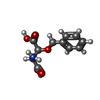 ChemComp-TB1: |
-Experimental details
-Structure determination
| Method | cryo EM |
|---|---|
 Processing Processing | single particle reconstruction |
| Aggregation state | particle |
- Sample preparation
Sample preparation
| Buffer | pH: 7.4 |
|---|---|
| Vitrification | Cryogen name: ETHANE |
- Electron microscopy
Electron microscopy
| Microscope | FEI TECNAI ARCTICA |
|---|---|
| Image recording | Film or detector model: GATAN K2 QUANTUM (4k x 4k) / Detector mode: COUNTING / Average electron dose: 53.0 e/Å2 |
| Electron beam | Acceleration voltage: 200 kV / Electron source:  FIELD EMISSION GUN FIELD EMISSION GUN |
| Electron optics | Illumination mode: FLOOD BEAM / Imaging mode: BRIGHT FIELD |
| Experimental equipment | 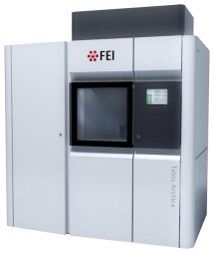 Model: Talos Arctica / Image courtesy: FEI Company |
- Image processing
Image processing
| Startup model | Type of model: NONE |
|---|---|
| Final reconstruction | Applied symmetry - Point group: C1 (asymmetric) / Resolution.type: BY AUTHOR / Resolution: 3.47 Å / Resolution method: FSC 0.143 CUT-OFF / Number images used: 132917 |
| Initial angle assignment | Type: OTHER |
| Final angle assignment | Type: NOT APPLICABLE |
 Movie
Movie Controller
Controller


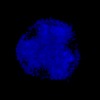




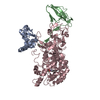
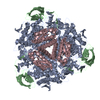
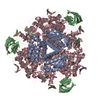
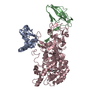
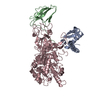
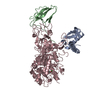

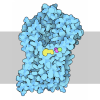
 Z (Sec.)
Z (Sec.) Y (Row.)
Y (Row.) X (Col.)
X (Col.)








